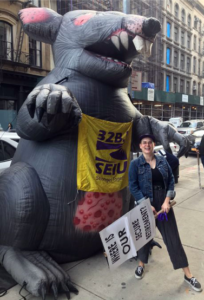 Haley Shaffer has been fighting for workers’ rights—including her own—for quite a while. But she says she’s just getting started.
Haley Shaffer has been fighting for workers’ rights—including her own—for quite a while. But she says she’s just getting started.
Haley moved from the Milwaukee area to New York City in 2014 for an internship at a non-profit organization, StoryCorps, and later took a staff position. “My coworkers and I were dealing with a toxic work environment—we were expected to give everything for little remuneration—so we started to organize in 2016,” Haley said. “And I found myself on the organizing committee.” After a challenging campaign, the staff union went public in 2017 under CWA 1180.
“That was my first experience with the labor movement,” Haley said. “I stayed at StoryCorps through 2018, through an NLRB hearing and several months on the bargaining committee, but after such a tough campaign I was ready to move on.”
After working at another non-profit with similar issues, Haley wanted to do something else. “I saw two of the staff organizers from CWA 1180 at a StoryCorps picket, and they told me I should think about coming back to the labor movement. One of those organizers, Leslie Fine, is a Union Semester graduate and she suggested I look at SLU’s programs. I was interested in developing my organizing skills, and I was really interested in making it my full-time job to work in the labor movement. So I enrolled in the Union Semester program in 2019. I got placed with United for Respect, which works on organizing employees at big corporations like Amazon and Target and WalMart. It was a great experience. Then David Unger suggested I go into 32BJ’s training program, and I did that for a semester, organizing residential building employees like porters and doormen.”
After two organizing internships, Haley said she was ready for a steady job with regular hours. “Ryan McGuire, another SLU grad, told me about an opening for an investigator in the Office of Labor Policy & Standards at the NYC Department of Consumer and Worker Protection. The job primarily involves investigating violations of the city’s labor laws, like the paid sick leave law and the Fair WorkWeek laws for fast food and retail workers. I interview workers and investigate their complaints against employers. Our goal, first and foremost, is to make sure the worker is made whole, whether that’s through being reinstated if they were illegally fired, having their sick pay restored, or being paid relief by the employer. One current matter that we’re pursuing is against several Chipotle locations across the city. We’ve already won reinstatement and back pay for one worker, and are continuing to investigate other locations. These cases are important, because they set the precedent for other companies.”
Haley started with the DCWP last March, right when COVID-19 hit New York full force. “The job took on a whole new sense of urgency, because our office was inundated with new complaints,” she said. “For several months over the summer I was answering the city’s COVID worker protection hotline. Folks from all across the agency are working on the hotline, fielding questions from workers concerned about their employers’ responsibilities to protect them from COVID, asking what the protocols are for reopening workplaces, asking about their right to sick leave. It was tiring work, but I really valued being able to help people during a crisis.”
Asked how her studies at SLU have helped prepare her for this work, Haley had a ready answer. “Being at SLU has really deepened my understanding of my job, and how much I love organizing. The School is so incredibly grounded in New York City and the labor movement. All the professors are actively involved in the labor movement. All of my classmates are organizers in their communities and workplaces, union members and union staffers. Everything I’m learning is pertinent to what I’m doing.” She added, “Last summer I took a course that I really loved, ‘Right to the City,’ with Kafui Attoh. He shifted the class content to focus on the COVID experience. I was pretty overwhelmed at the time, working on DCWP’s COVID hotline, and being able to have conversations in class with smart people with different perspectives really helped me process it.”
Stephanie Luce has also had a big influence on Haley. “I was lucky enough to take four of Stephanie’s classes, and last spring she asked me to work with her on a white paper for the Writers Guild,” Haley said. “I had never had anything published so it was great to work with Stephanie and learn her process. She gave me a lot of autonomy and trusted me to do my part of the work. It was a terrific experience and I learned a lot from it that I’m using as I write my Capstone.”
Haley added, “Being at SLU has really helped me realize how much I value my work, and my passion for organizing. Even though I miss seeing my teachers and classmates in person, I’m still learning from them and getting a lot of perspective. Every single person at SLU is a resource—they all have so much experience and they are so helpful. And that’s something you can’t say about other schools.”


